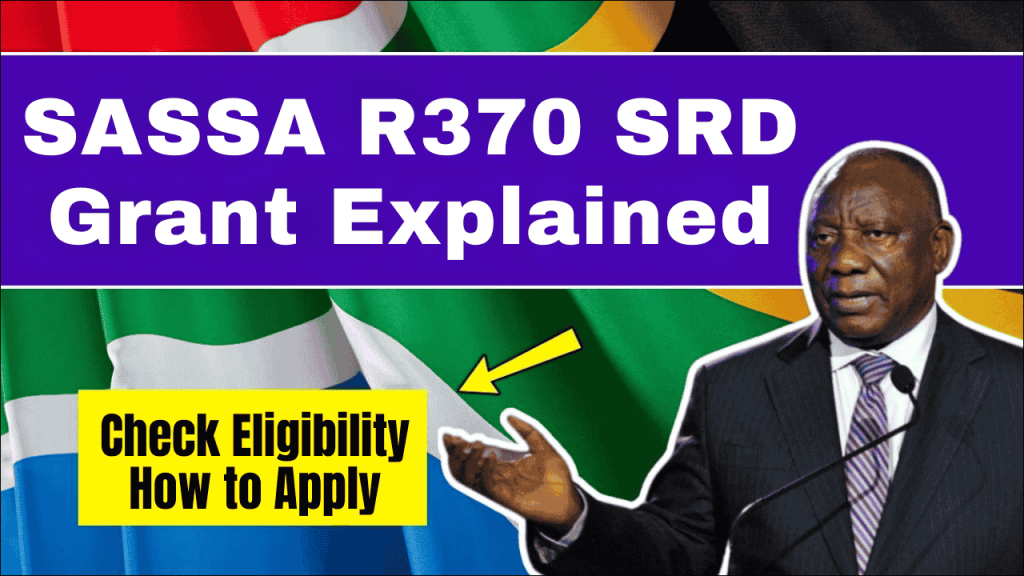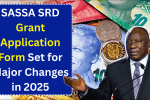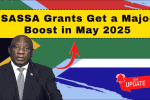
The Social Relief of Distress (SRD) Grant has received its first increase in several years, rising to R370 per month effective May 1, 2025. This R20 boost represents a significant development for millions of unemployed South Africans who depend on this crucial financial lifeline. As economic pressures continue to affect vulnerable populations across the country, understanding how to access this support has become increasingly important.
What is the SRD Grant?
The Social Relief of Distress Grant was initially introduced in May 2020 as a temporary measure to provide financial assistance during the COVID-19 pandemic. Due to persistent unemployment challenges and ongoing economic hardship, the grant has been extended multiple times and has now become a semi-permanent fixture in South Africa’s social security framework.
The grant targets unemployed citizens aged 18-59 who have no other means of financial support. Unlike other SASSA grants that focus on specific demographic groups such as older persons, children, or those with disabilities, the SRD Grant specifically aims to provide a basic safety net for working-age adults who fall outside the traditional social security system.
May 2025: Historic First Increase
After years of maintaining the grant at R350 despite rising inflation, the South African government has implemented a modest but significant increase:
| Description | Previous Amount | New Amount (May 2025) | Increase |
|---|---|---|---|
| Monthly SRD Grant | R350 | R370 | R20 (+5.7%) |
| Annual Value | R4,200 | R4,440 | R240 |
While the R20 increase may appear small, it represents an important policy shift and acknowledgment of the continued economic challenges faced by unemployed South Africans. Social development advocates have welcomed this as a first step while continuing to push for further enhancements to align the grant more closely with the cost of living.
Who Qualifies for the SRD R370 Grant?
Eligibility for the SRD Grant is determined by specific criteria established by the Department of Social Development and SASSA. To qualify for the grant, applicants must meet the following requirements:
| Eligibility Criteria | Details |
|---|---|
| Age | Between 18 and 59 years |
| Residency | South African citizen, permanent resident, or refugee registered with Home Affairs |
| Employment Status | Unemployed (not receiving income from work) |
| Financial Status | No financial support from any other source |
| Other Grants | Not receiving any other social grant or unemployment insurance benefit |
| Income Threshold | Monthly household income below R850 per person |
| Institutional Support | Not residing in a government institution or receiving significant state support |
It’s important to note that meeting these criteria does not guarantee approval. Applications undergo rigorous verification against various government and financial databases to confirm eligibility.
For detailed eligibility information, visit the Official SASSA SRD Grant Eligibility Page.
How to Apply for the SRD R370 Grant
Applications for the SRD Grant are exclusively digital, requiring no in-person visits to SASSA offices. The application process has been designed to be accessible across various platforms:
Application Channels:
- SASSA SRD Website: The primary application platform is the SASSA SRD Grant Portal, which provides a step-by-step application process.
- WhatsApp Application: Send “SRD” to 082 046 8553 to initiate the application process via WhatsApp.
- USSD Application: Dial 1347737# from any mobile phone and follow the prompts (no data required).
- GovChat App: Download the GovChat application from your device’s app store and select the SRD Grant application option.
Each of these channels will guide applicants through the same basic process, requiring similar information.
Required Information for Application:
- South African ID number
- Full name as it appears on ID document
- Gender and disability status
- Contact details (cell phone number)
- Residential address
- Banking details (if available)
- Education level and employment status
For those without banking details, payment options include mobile money transfers, the South African Post Office, or Pick n Pay and Boxer Stores.
Monthly Payment Schedule and Process
SRD Grants are typically paid in the second week of each month, following the disbursement of other SASSA grants. The specific date varies monthly, but SASSA announces payment dates through their official communication channels.
| Month (2025) | Expected Payment Window |
|---|---|
| May | May 10-15, 2025 |
| June | June 11-16, 2025 |
| July | July 10-15, 2025 |
| August | August 11-16, 2025 |
| September | September 10-15, 2025 |
| October | October 11-16, 2025 |
Note: These dates are approximate and subject to change. Recipients should regularly check the SASSA Payment Calendar for official announcements.
Verification and Approval Process
After submission, applications undergo a comprehensive verification process against various databases to confirm eligibility:
- Initial Validation: Basic information verification against Department of Home Affairs records
- Financial Assessment: Cross-checking with:
- UIF database (to verify unemployment status)
- SARS database (to confirm income status)
- Banking verification (to check for active income)
- SOCPEN database (to confirm no other grant receipt)
- Decision Notification: Applicants receive an SMS notification of approval or rejection
This verification process typically takes 5-10 working days, though delays can occur during high-volume application periods.
Reconsideration Process for Rejected Applications
If an application is rejected, applicants have the right to request reconsideration. The process has been simplified in 2025:
- Visit the SRD Grant Appeal Portal
- Enter your ID number and phone number
- Select the rejected month(s) for reconsideration
- Provide additional information or documentation to support your case
- Submit your reconsideration request
Reconsideration requests should be lodged within 30 days of receiving the rejection notification. The reconsideration process typically takes 30-60 days, after which applicants receive notification of the outcome.
Common Reasons for Application Rejection
Understanding why applications are rejected can help future applicants avoid common pitfalls:
| Rejection Reason | Explanation |
|---|---|
| Alternative Income Source | Database verification showed other income sources |
| UIF Registration | Applicant is registered for UIF benefits |
| ID Verification Failed | Identity information couldn’t be verified with Home Affairs |
| Banking Verification Failed | Bank account verification failed or showed income |
| Institutionalized | Applicant is in a government institution receiving support |
| Deceased | ID number registered as deceased in Home Affairs database |
| Identity Fraud | Multiple applications using the same identity |
| Already Receiving Grant | Applicant already receives another social grant |
For assistance with rejected applications, applicants can contact the SASSA SRD Grant Helpline at 0800 601 011.
Impact of the SRD Grant in South Africa
The SRD Grant has become a critical component of South Africa’s social safety net, providing essential support to millions of citizens:
| Impact Area | Statistics |
|---|---|
| Total Recipients | Approximately 8.5 million people |
| Monthly Distribution | R3.15 billion (at R370 per recipient) |
| Annual Distribution | R37.8 billion |
| Primary Beneficiaries | Youth (18-35) represent 67% of recipients |
| Gender Distribution | Women: 53%, Men: 47% |
Economic research has shown that the grant significantly reduces food insecurity and extreme poverty among recipient households, with most funds being spent on essential food items, transportation, and educational needs.
Looking Ahead: Future Developments
The May 2025 increase to R370 is part of ongoing discussions about the future of income support in South Africa. Several important developments may affect SRD Grant recipients in the coming years:
Potential Transition to Basic Income Grant
The Department of Social Development has indicated that the SRD Grant may eventually transition into a more permanent Basic Income Grant (BIG). This potential development would provide more stable, long-term support for unemployed South Africans.
October 2025 Review
While the main focus of the October 2025 grant increases is on other SASSA grants (Older Persons, Disability, etc.), the government has committed to reviewing the SRD Grant amount again before the end of the fiscal year.
Enhanced Digital Payment Systems
SASSA is developing improved payment systems to reduce collection delays and fraud. Recipients are encouraged to provide banking details where possible to facilitate faster, more secure payments.
For the latest policy updates, visit the Department of Social Development Policy Portal.
Fraud Prevention and Grant Protection
As the grant amount increases, so too do attempts to defraud the system and its recipients. SASSA has implemented additional security measures and provides the following guidance:
- Never share your PIN or ID details with anyone, including those claiming to be SASSA officials
- No payment is required to apply for or collect the SRD Grant
- Official communication comes only through the registered phone number or formal SASSA channels
- Report fraud immediately to the SASSA fraud hotline: 0800 701 701
SASSA never requests fees, banking details via social media, or personal information through unofficial channels. For official fraud prevention information, visit the SASSA Fraud Awareness Page.
Conclusion: Maximizing Your SRD Grant Benefit
While the R370 monthly grant may seem modest, it provides crucial support for basic needs. Recipients are encouraged to:
- Ensure application information is accurate and complete to avoid processing delays
- Check application status regularly through the SASSA SRD portal
- Update contact details promptly if they change to receive notifications
- Keep proof of application (reference numbers) for follow-up if needed
- Plan for predictable payment cycles rather than expecting immediate disbursement
The SRD Grant continues to evolve as a critical component of South Africa’s social protection framework. The May 2025 increase, while modest, signals ongoing commitment to supporting vulnerable citizens during challenging economic times.
For comprehensive information about all SASSA services and grants, visit the SASSA Official Website.

Isabell Johnson is a passionate writer known for captivating stories that blend imagination and reality. Inspired by travel, history, and everyday moments, She crafts narratives that resonate deeply with readers.




